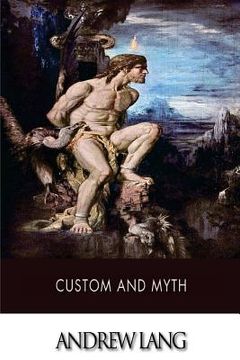Reseña del libro "Custom and Myth (en Inglés)"
This is a comprehensive history that looks at various legends, fairy tales and mythology from around the world. From the intro: "Though some of the essays in this volume have appeared in various serials, the majority of them were written expressly for their present purpose, and they are now arranged in a designed order. During some years of study of Greek, Indian, and savage mythologies, I have become more and more impressed with a sense of the inadequacy of the prevalent method of comparative mythology. That method is based on the belief that myths are the result of a disease of language, as the pearl is the result of a disease of the oyster. It is argued that men at some period, or periods, spoke in a singular style of coloured and concrete language, and that their children retained the phrases of this language after losing hold of the original meaning. The consequence was the growth of myths about supposed persons, whose names had originally been mere 'appellations.' In conformity with this hypothesis the method of comparative mythology examines the proper names which occur in myths. The notion is that these names contain a key to the meaning of the story, and that, in fact, of the story the names are the germs and the oldest surviving part. The objections to this method are so numerous that it is difficult to state them briefly. The attempt, however, must be made. To desert the path opened by the most eminent scholars is in itself presumptuous; the least that an innovator can do is to give his reasons for advancing in a novel direction. If this were a question of scholarship merely, it would be simply foolhardy to differ from men like Max Müller, Adalbert Kuhn, Bréal, and many others. But a revolutionary mythologist is encouraged by finding that these scholars usually differ from each other. Examples will be found chiefly in the essays styled 'The Myth of Cronus, ' 'A Far-travelled Tale, ' and 'Cupid and Psyche.' Why, then, do distinguished scholars and mythologists reach such different goals? Clearly because their method is so precarious. They all analyse the names in myths; but, where one scholar decides that the name is originally Sanskrit, another holds that it is purely Greek, and a third, perhaps, is all for an Accadian etymology, or a Semitic derivation. Again, even when scholars agree as to the original root from which a name springs, they differ as much as ever as to the meaning of the name in its present place. The inference is, that the analysis of names, on which the whole edifice of philological 'comparative mythology' rests, is a foundation of shifting sand. The method is called 'orthodox, ' but, among those who practise it, there is none of the beautiful unanimity of orthodoxy. These objections are not made by the unscholarly anthropologist alone. Curtius has especially remarked the difficulties which beset the 'etymological operation' in the case of proper names. 'Peculiarly dubious and perilous is mythological etymology. Are we to seek the sources of the divine names in aspects of nature, or in moral conceptions; in special Greek geographical conditions, or in natural circumstances which are everywhere the same: in dawn with her rays, or in clouds with their floods; are we to seek the origin of the names of heroes in things historical and human, or in physical phenomena?' {3a} Professor Tiele, of Leyden, says much the same thing: 'The uncertainties are great, and there is a constant risk of taking mere jeux d'esprit for scientific results.'{3b} Every name has, if we can discover or conjecture it, a meaning. That meaning-be it 'large' or 'small, ' 'loud' or 'bright, ' 'wise' or 'dark, ' 'swift' or 'slow'-is always capable of being explained as an epithet of the sun, or of the cloud, or of both. Whatever, then, a name may signify, some scholars will find that it originally denoted the cloud, if they belong to one school, or the sun or dawn, if they belo

